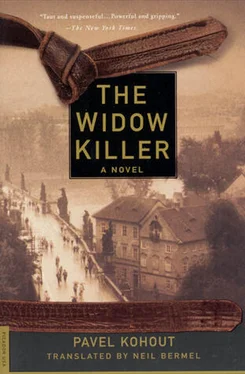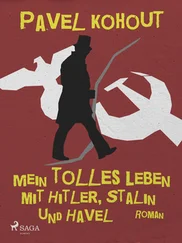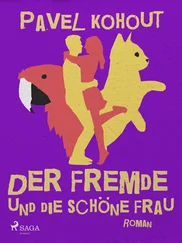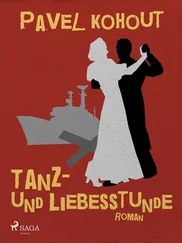“It’s the only valuable item we have, but it hung there even before it was temporarily lost. Right after the death of the baron who bequeathed it to us, some of the parents requested we hang it where their children wouldn’t see it.”
They understood as soon as they saw the picture. The baroque painter had rendered in oil with shocking accuracy what Superintendent Beran had scrupled to show the public at large. In front of them was essentially the same altar of death the widow killer left at the scene of the crime, albeit with a classical backdrop. The tortured saint had both breasts cut off and her intestines were being wound on a windlass. The artist had added to this a snow-white dove flying from the bloody wound below the severed head.
Morava’s eyes met Buback’s in mute awe. The explanation was here in front of them. They would need the priest, however, to interpret it for them.
“Father,” Morava began, once the vicar had poured them some quite decent coffee back at the rectory and it was clear the German was letting him take the initiative, “I apologize for not understanding your message right away. I’m not a Catholic, and the point of it escaped me. It’s highly probable that the man who has so far tortured six women to death was inspired by this work. You wrote us that it was lost and then returned; please tell us more about this.”
The old man had seemed quite eager when he first saw them, but now he seemed equally hesitant. His hands were folded; the balls of his fingers pressed against his knuckles until his nails and skin turned white.
“The theft occurred before the war… if you can call it a theft. When the man in question returned the picture personally, he asked me to believe he’d only borrowed it.”
“Which man in question?” Morava asked almost casually.
The priest did not fall for the snare.
“If you’d permit me, I’d like to describe the whole episode for you first….”
Morava nodded, even though it required superhuman self-restraint to put off the moment when they would learn the man’s name.
“I knew him because—” The priest once again halted and looked for the right words. “Well, let’s just say I knew him well. He was a brave and pious man who had one single but fundamental problem: He could never escape the clutches of his domineering mother. His father — her partner — left her before he was born. What hurt her most of all was that he took up with a much older widow.”
Yes! Morava was already sure: It’s our man! He glanced fleetingly at the German, but Buback still wore the impersonal mask of disinterested officialdom.
“I’m not an expert on women’s minds“—the priest opened his childishly chubby hands apologetically—“but from experience I know that women like that make their child — especially if it’s a man — the single focus of their lives, their so-called alpha and omega. He’s supposed to restore her trampled honor, become a sort of avenging knight for her.”
Very accurate, Morava thought admiringly; it fits like a glove. If only he’d tell us already who it is!
“The son’s attempt to break free began successfully. He enlisted in the new Czechoslovak Army; he had a promising career ahead of him. However, he suffered a severe concussion on the Hungarian border after a grenade explosion. He was discharged and remained dependent on his mother until almost forty. Then, for the first time, he met a girl when he was out of town on his own. It was a passing acquaintance on a train; no normal man would have attached any significance to it, but he was so inexperienced that he did exactly that. She too was a recent widow, still in black, and unfortunately she gave him her address.”
“Was she from Brno?” Morava blurted out.
“Yes,” the cleric said, stunned. “How did you know?”
“Please continue.”
“He finally confessed his love-at-first-sight to his mother, who was enraged at the thought of losing him to a widow. She tried to make him see the vileness of it — creatures still in mourning who stole honest women’s husbands and sons. She reminded him about his father, whose lover abandoned him soon after, driving him to suicide. She wished the fate of Reparata on those widows. For the first time, though, he found the courage to stand up to her and leave. Unfortunately it was for a love he had dreamed up out of thin air.”
“She wasn’t alone,” Morava guessed.
“Unfortunately, on that evening she was. And when a man she didn’t even recognize asked for her hand at the front door, she mocked him….”
The priest flushed and fell silent. He seemed to be fighting himself as to whether or not to continue. This time Buback spoke.
“Did he confess to you that he’d killed her as well?”
“Yes…,” the priest whispered in a rasp, “he did… didn’t he….”
“And when did he—”
“Two years later. Our country was already occupied—” He halted and glanced fearfully at Buback. “I mean taken under the Reich’s protection. ..”
The German smiled understandingly.
“He appeared out of the blue as a voice in the confessional. ’Father,’ I heard, without even recognizing him, ’ leaned your picture against the door to the sacristy.’ Then he told me this story in detail….” Sweat broke out on the cleric’s forehead. “An awful story — that he had punished her, for his mother’s sake as well, just as the executioners punished that poor martyr…. I didn’t know what to say, much less what to do….”
It was as if he were lost in his memories; both detectives ceased to exist for him. They all sat motionless for several long seconds before Buback sensibly asked, “And finally you…?”
“The confessional was stifling; I ran out and over to him….”
“To whom?” Morava tried.
The narrator was present in space, but not in time.
“I locked the church and dragged him and the package into the sacristy. He looked the same as always: vigorous, keen. His problem wasn’t at all obvious, except for a certain shyness toward women; I was probably the only one who knew about it, from confession….”
He halted, as if he’d said something inappropriate, and was once again back with them.
“He said he didn’t tell his mother, of course, but when she was hit by a car and died, she must have found out up there, because she praised him and urged him to continue his work of purification. And he told me all of this as if it were a perfectly everyday occurrence. Yes, I thought just what you’re thinking now: the grenade wound. I begged him to see a doctor. He shouted and got so angry that it frightened me. As a priest, he said, I should believe in life after death, and anyway, he’d come to confess, not to turn himself in; why didn’t I just send him to the police? All I could do was refuse him absolution until he could tell me that he deeply regretted his deed and would never again spill blood. He kissed my hand silently and went…. I never heard of him again, nor of any horrors like the ones he told me about. In time I convinced myself that this picture of ours had conjured up a monstrous fantasy in him, and therefore he returned it to us… until the local policeman brought me the news….”
“Father,” Morava addressed him once he realized the man had finally finished, “we’re deeply indebted to you for this information, because — and I’m convinced of it — it frees us from the darkness. We’ve been looking for a needle in a haystack, and now we know where it is. Or we will know, once you tell us his identity. He knew the picture. Does he come from around here?”
The old man’s hands shook.
“That’s the thing… that’s my problem. I’ve lived with it ever since. My church is consecrated to Saint Jan Nepomuk, who was tortured rather than betray the secrets of the holy confessional….”
Читать дальше












